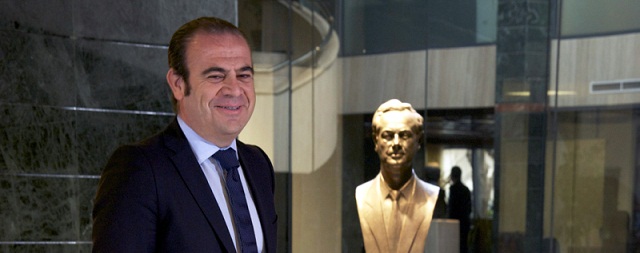Last summer numbers have been good for Spanish tourism, but for decades it’s been said there is a crisis in that sector. How serious are its problems?
Well, there are issues to be resolved: the conversion of supply, labour policy, planning regulations, environmental and costs, visa policy, taxation, air connectivity… The National Comprehensive Tourism Plan just presented by the government is going in this direction, and as a road map is good, but I think they should look, for example, at the Balearic Islands. Our Department of Tourism has made a courageous bet for public-private partnerships.
What has been the crisis impact on the sector in Spain?
It’s been very important. It has caused an oversupply adjustment, which is exacerbated by an unnatural fall in domestic demand and it is due to the lack of jobs and confidence of the Spanish citizens. As a more diversified business between city and resort segments, and also more internationalised, we have been less affected. Still we’ve had to implement contingency plans in order to contain domestic tourism’s fall impact.
You talk about oversupply, despite the closure of hotel units, and you have also mentioned that there are many hotels no longer able to compete with those of Croatia, Turkey or Tunisia.
During the real estate boom there was such an abundance of land in the hands of developers as well as funding that Spain was filled with hotels, even in secondary cities. And although by 2008 the sector began to suffer the effects of this excess supply, at that time demand could absorb the supply.
But after the crisis that erupted like a house of cards. Now we find that part of the offer is obsolete and uncompetitive. It should be reformed or redirected to another business model. And there is a glut of new hotels that do not respond to real demand.
Where has this oversupply erupted the most? In the coast or in the cities?
I’d say in the urban segment. In vacation resorts we see less excesses. Anyway a modernisation plan is needed: we need to renovate and reposition products towards more competitive and profitable segments, that’s what we did in this tourist resort Meliá in Majorca.
Data seem to show that the occupation level is improved at the expense of lowering the prices. What’s happening now with new competition from our neighbours in the Mediterranean?
We have experienced many years of strong price pressure, oversupply, because most of these hotels belong to companies outside the hotel sector that mixed competitiveness with lower prices, which deteriorated the quality. We and other Spanish hotel brands are still struggling to keep prices in line with the quality we offer. I’ve spent years claiming that the price war is negative, it’s a spiral of declining quality, loss of profitability, infra offer, that leads to closing facilities and destinations.
Is it possible for Spain to compete on price with countries like Egypt or Morocco?
The lowest price model does not interest us. We can not compete with much cheaper destinations. Again, the Spanish tourism must be renewed to receive a more affluent tourist.
Do not forget that five-star hotels have a worker for every 3,6 customers and one-star hotels just have an employee for every 13 guests. It would also be impossible to compete on price. For example, after the “Arab Spring”, the London Underground was packed with offers to spend a week in Egypt in luxury hotel for a price which in our case would not even cover the costs… Fighting agains that is not a solution for Spain.
What then is the solution to this kind of Rubik’s Cube?
Basically two points: first, to value our differential attributes as a country, which are many, and that emerging destinations do not have themselves: gastronomy,cultural and historical heritage, holiday, sympathy, security, biodiversity, our proximity to Europe, our geopolitical location, infrastructure and health care network… Second, to eliminate all those specific barriers that hinder our tourism competitiveness. I mean fiscal barriers and over-taxation, over-regulation and excess of government offices, visa problems, the lack of professional skills and foreign languages, the lack of market unit…
Is that lack of market unity that big?
It is. As the National Plan and Comprehensive Tourism just presented by the government shows, this is a real problem that affects us greatly. We have environmental regulations, economics, urban planning, business, language, transportation, and so on. All those are areas where there is sometimes duplicity or multiplicity of powers by the state insular, regional, municipal or European authorities.
To sum up, do you believe Morocco, Egypt and Turkey’s success meansthey are doing something that we are not?
I think they have developed policies that might be called “countercyclical” to improve their competitiveness, while in Spain we have continued with the idea that tourism is the “goose that lays the golden egg” and prioritising sectors that have not the power to take us out of the crisis, such as the automotive sector, for example. Also, while Greece and Turkey eliminated air taxes, we increased them. We raised our VAT while our competitors froze or lowered theirs. We cannot afford so many mistakes.






Be the first to comment on "Meliá Hotels CEO Gabriel Escarrer: “We must eliminate over-taxation, over-regulation to improve competitiveness”"